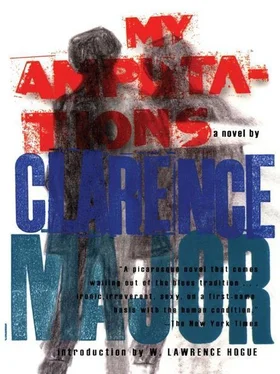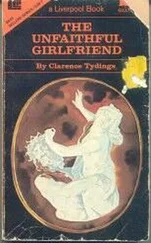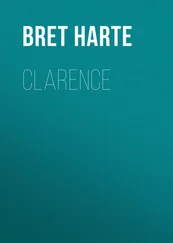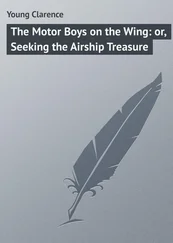Clarence Major - My Amputations
Здесь есть возможность читать онлайн «Clarence Major - My Amputations» весь текст электронной книги совершенно бесплатно (целиком полную версию без сокращений). В некоторых случаях можно слушать аудио, скачать через торрент в формате fb2 и присутствует краткое содержание. Год выпуска: 2008, Издательство: Fiction Collective 2, Жанр: Современная проза, на английском языке. Описание произведения, (предисловие) а так же отзывы посетителей доступны на портале библиотеки ЛибКат.
- Название:My Amputations
- Автор:
- Издательство:Fiction Collective 2
- Жанр:
- Год:2008
- ISBN:нет данных
- Рейтинг книги:5 / 5. Голосов: 1
-
Избранное:Добавить в избранное
- Отзывы:
-
Ваша оценка:
- 100
- 1
- 2
- 3
- 4
- 5
My Amputations: краткое содержание, описание и аннотация
Предлагаем к чтению аннотацию, описание, краткое содержание или предисловие (зависит от того, что написал сам автор книги «My Amputations»). Если вы не нашли необходимую информацию о книге — напишите в комментариях, мы постараемся отыскать её.
My Amputations — читать онлайн бесплатно полную книгу (весь текст) целиком
Ниже представлен текст книги, разбитый по страницам. Система сохранения места последней прочитанной страницы, позволяет с удобством читать онлайн бесплатно книгу «My Amputations», без необходимости каждый раз заново искать на чём Вы остановились. Поставьте закладку, и сможете в любой момент перейти на страницу, на которой закончили чтение.
Интервал:
Закладка:
This riffing on various themes and situations happens throughout the text. The narrator gives us several different versions of Mason's stay in the Air Force. He gives different riffs on the Chemical Bank robbery, without hierarchy or privilege. In giving us this play on the various events and situations in the text, the narrator, and thus Major, demonstrates that language cannot completely master a subject, that language cannot pin down meaning. It can only give us significations of the subject or the social real.
But as the narrator gives us the story of Mason Ellis in these blocked, discontinuous, jazz-styled modes, he interrupts the narrative and comments on the processes of producing the text. Very early in My Amputations , the narrator presents a block filled with diverse images of his childhood: his days in the Air Force, his desire to write, and the presence of his muse Celt, with allusions to Toomer, Conrad, Zola, Dickens, and others. Halfway through the block he asks, “Realism? Not really” (10). In another imagined block about robbing Chemical Bank, the narrator disrupts the narrative and asks, “If I tie a string to his nervous little finger and connect it to a large C hanging, say, in the sky, then connect the C to Celt and from her stretch it from myself to Mason, then jerk the end of the damn-thing — what would happen? Would I get any added up, totalized meaning, plot?” (37) The questions are a play on traditional fiction's desire to arrive, through causal progression, at a resolution. Of course, Major raises these questions in a text that does neither. Later, the narrator rejects “the assumption that language offered a logical means by which one might understand” (54), undermining the naturalized notion that fiction tells the “truth,” that fiction is a “model for reality” (54). Lastly, in his lecture at Sarah Lawrence, Mason tells members of his audience that they should think of him as a character in a novel, revealing himself as a fictional construct. In exposing the writing process, Major demonstrates that My Amputations is necessarily bound to social reality only by its status as an artifact within that world and by virtue of it being an extension of an author whose imaginative acts brought it into existence.
Finally, Major plays with the idea of authorship in My Amputations , echoing the postmodern idea of the death of the author. In an interview, Major states: “Exploring different personae in my earlier novels was something that grew out of my sense of personal fragmentation…. Back when I was starting out to write, it felt perfectly natural to have my work reflect this sense that I was literally a different person every time I sat down to write. It was an interesting challenge to find narrative contexts for different parts of myself that needed voices to express themselves.” 6In a Lacanian sense, Major is defining subjectivity, including his own, as relative, multiple, de-centered, contradictory, and shifting. According to Jacques Lacan, the “real,” which is excluded from representation, resists “symbolization absolutely.” 7Therefore, the subject we get in language is not whole; it is fractured and distorted. This distortion is manifested as lack of being, and it is this void that desire constantly attempts to fill. Thus, the “I” becomes a network of signifiers that exists in and embodies language. Because the Lacanian self/I has several selves/signifiers, it becomes difficult to gain access to the self through language, especially since language continually misrepresents the self as being whole.
This is the problem of the writer when he makes himself his subject. By introducing the Author who has assumed the name of Clarence McKay (with initials C. M., the same as Clarence Major, who becomes the Imposter) into the text, Major creates a fictional self within the narrative. But the narrator — who sometimes refers to himself as “me”—and Mason are also selves or “different parts” of the Author, Clarence Major. The narrator, who is hip, ironic, versed in jazz and blues, and knows literature, art, and classical music, sounds very much like Clarence Major. Mason, like Major, does a stint in the Air Force. Also like Major, he is the author of two novels and an anthology of Afro-American slang. In focusing on the meta-fictional aspects of literature, he, like Major, thinks that imagination and pushing the boundaries of language are important dimensions of fiction. If C. M., Mason, and the narrator are linguistic constructs of Clarence Major, they serve as an ironic frame for Clarence Major's own logocentric quest for origin and mastery, a quest he continually deconstructs.
In the midst of this awareness of language, narrative, and subjectivity, My Amputations , in a fragmented and discontinuous form, gives us provisionally the story of Mason Ellis, who is born in Georgia but is raised in Chicago. After his father leaves, his mother remarries and he lives with his mother, stepfather, and two sisters. He wants to write, and he possesses a muse who guides him. At eighteen, he enters the Air Force, where he spends time in Cheyenne, Wyoming; San Antonio, Texas; Valdosta, Georgia; and Florida, experiencing humiliating racism before being honorably discharged and returning to Chicago. His first marriage to Judith results in six children in the “wink of a birthcontrolless eye” (12), but he has difficulties providing for them. When a caseworker tells him that the father's absence will mean larger paychecks for his family, he leaves. Six months after he meets Mary Lou, she gives birth to triplets, and his dream of becoming a famous writer vanishes, until he steals C. M.'s identity.
Mason also has a criminal dimension to his existence, a history of petty theft. While in New York, he is arrested, and he serves time in Attica, where he becomes a reader. In fact, in Attica he reads the Author's works repeatedly until he convinces himself that he is the Author. One day while he is watching an award ceremony on television, he witnesses the Author accept an award and money. He believes that the Author has stolen his identity. When he is paroled from prison, Mason breaks into the Author's apartment, beats him up, and demands money. Mason kidnaps the Author and subjects him to torture, but the Author refuses to break, forcing Mason to put him on a freight train bound for the West. After successfully assuming the Author's identity, Mason barges into the office of the publisher, Ferrand, and demands money. Later, he seals his identity by getting a fake passport that “proves” he is the Author. Now that he has become the Author, with one of the sheets in his pocket identifying him as “post-modern” (53), he must figure out what the term means. More importantly, he has to answer the question, “Who am I, really?”
The question puts Mason on the typical, modern, Western quest for the self, absolute knowledge, or the Father. Now that his grant has given him sufficient publicity as a known writer, he needs to take advantage of it. Mason embarks on a lecture tour of college campuses in the United States. Then he takes his lecture tour to Europe where he visits museums, looking for connections that will make him whole. Finding Paris a disappointment, he settles in Nice, and also visits Italy and Greece. In Florence, “he looks into the face of the city: workers in stone had made it a towering monument to something he reluctantly understood. Well, even he was beginning to realize the real subject of his story wasn't this damned quest he'd thought he was on…. Wasn't he really playing the ultimate pinball machine of luck and trying… to be himself' (135–136). Can we know ourselves? Major is saying we cannot be a whole self; we can only be versions of the self. At the National Museum in Athens, Mason tries to elicit a sign of recognition from a Cycladie: “From her stern place as mother goddess and model for modern sculpture she refused to respond. Mason was unworthy? Insulted, he rushed on. Goddess Hygieia? She would not heal him” (153–154).
Читать дальшеИнтервал:
Закладка:
Похожие книги на «My Amputations»
Представляем Вашему вниманию похожие книги на «My Amputations» списком для выбора. Мы отобрали схожую по названию и смыслу литературу в надежде предоставить читателям больше вариантов отыскать новые, интересные, ещё непрочитанные произведения.
Обсуждение, отзывы о книге «My Amputations» и просто собственные мнения читателей. Оставьте ваши комментарии, напишите, что Вы думаете о произведении, его смысле или главных героях. Укажите что конкретно понравилось, а что нет, и почему Вы так считаете.












